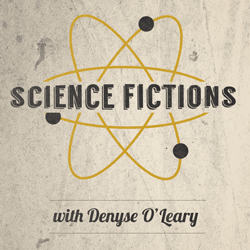 Evolution
Evolution
 Faith & Science
Faith & Science
If Naturalism Can Explain Religion, Why Does It Get So Many Basic Facts Wrong?
Naturalism, the idea that nature is all there is, has no shortage of theories seeking to explain religion. However, I would like to observe a simple fact: Most of what naturalism tells us about the practical effects of those religions most studied today is wrong, at least with respect to science.
 This should come as no great surprise. In cosmology, naturalism ends in a campaign against falsifiability. In studies of the origin of life, it ends in "if only" chemistry that ignores the huge information component of life. In human evolution, it ends with far more pop science than important fossils. In discussions of the human mind it ends in nonsense, for example, efforts to pretend that consciousness is a physical thing.
This should come as no great surprise. In cosmology, naturalism ends in a campaign against falsifiability. In studies of the origin of life, it ends in "if only" chemistry that ignores the huge information component of life. In human evolution, it ends with far more pop science than important fossils. In discussions of the human mind it ends in nonsense, for example, efforts to pretend that consciousness is a physical thing.
Let’s consider some front-runner naturalist theories about religion in general, but before we do, we might look at claims about traditionally religious people in the much-studied Western world. For example, we are often told that people of this sort are "anti-science." But discussing Gordon Gauchat’s study of liberals, moderates, and conservatives on science, analyst Lawrence Solomon observes a little-noticed trajectory:
In 1974, the starting point for the study, all political groups that he considered — liberals, moderates and conservatives — held science in high esteem, with conservatives the most enamoured of science of the three, followed closely by liberals and then moderates. It was the moderates, not the conservatives, who first became disillusioned with the scientific establishment, and the moderates remain relatively disillusioned today. After the moderates began their disillusionment, conservatives, too, began to question the science that the establishment was purveying. Today the conservatives are more disillusioned than even the moderates, but only by a small margin. … The liberals, on the other hand, never stopped being enamoured by the scientific establishment, never took seriously the complaints of establishment critics, never themselves questioned the science that the establishment produced.
Today, liberals of all education levels "more resemble the uneducated conservatives and moderates in his study cohort, who have also been relatively resistant to change." These results make sense if we consider that educated people probably know more about the significant recent increase in science-related scandals than others do. But because suspect or exploded studies often support liberal beliefs, liberals might keep the faith anyway.
Similarly, sociologist John H. Evans found conservative Protestants "equally likely to understand scientific methods, to know scientific facts and to claim knowledge of science. They are as likely as the nonreligious to have majored in science or to have a scientific occupation."
In any event, religious affiliation tends to grow, not shrink, with education level. Joel Slotkin notes, "A new University of Nebraska study finds that with each additional year of education, the odds of attending religious services increased by 15%." This finding accords with Charles Murray’s review of research in Coming Apart (2012).1 Despite well-publicized claims, there is no significant relationship between religion and the likelihood of ignorance of or indifference to science.
Another claim we hear, from celebrity skeptic Michael Shermer for example, is that science — and he of course includes Darwinian mechanisms for evolution in that category — is objective knowledge that will save us from superstition. But in the United States, a 2007-2008 Baylor University survey reported that
traditional Christian religion greatly decreases credulity, as measured by beliefs in such things as dreams, Bigfoot, UFOs, haunted houses, communicating with the dead and astrology (Ch. 15, "Credulity: Who Believes in Bigfoot").
They found that self-identified theological liberals and irreligious people were far more likely to believe in such things than other Americans. In other surveys, non-religious people are more likely to see UFOs2 and religious liberals are more likely to believe in astrology. In short, religion as such may not suppress superstition but orthodoxy clearly does.
If faith is declining, as some say, the future may look worse for science: A study by the astronomy department at the University of Arizona reported (2011) on a survey of nearly ten thousand undergraduates over two decades, and found that "a large majority of students (78%) considered astrology ‘very’ or ‘sort of’ scientific. Only 52% of science majors said that astrology is ‘not at all’ scientific." The conclusion the researchers drew was ominous: "belief in astrology is likely not a valid indicator of scientific illiteracy."
One wonders, somewhat impatiently, then what is a valid indicator of scientific illiteracy? Questioning vast, poorly sourced claims for Darwinian evolution? Doubting vast claims for habitable planets, space aliens, origin of life soup recipes, or material components to consciousness?
Unfortunately, if naturalism is science, then our brains are shaped for fitness, not for truth, and we are allowed whatever science theory we fancy as long as it has not been forbidden for political reasons.
Coming up: The three key naturalist theories about religion.
References:
(1) Charles Murray, Coming Apart: The State of White America, 1960-2010, Crown Forum, 2012, p. 204. Murray found that it was the working class, not the upper middle class, that was losing its religion.
(2) Thomas Hargrove and Guido H. Stempel III, "Poll probes Americans’ belief in UFOs, life on other planets," Scripps News, July 15, 2008
Image: Starry Night, by Vincent van Gogh [Public domain], via Wikimedia Commons.
Editor’s note: Here is the "Science Fictions" series (the human mind) to date at your fingertips.

